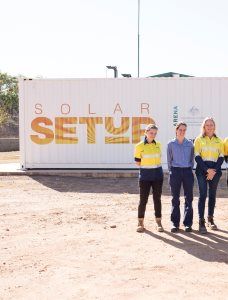Power and Water owns and operates the Northern Territory power network. We also provide electricity generation and retail to 72 remote communities and 66 outstations through our not-for-profit subsidiary, Indigenous Essential Services.
We access a variety of power sources to meet growing demand in remote regions. We're moving to renewables, such as solar, wherever we can.
Where remote towns and communities are near existing services, we buy power from third-party suppliers.
Maintaining reliable power in isolated areas can be a challenge. The communities we cater to scatter across tropical and arid environments. Remote communities need resilient services.
The primary source of fuel for our remote power stations is currently diesel. We own and operate 51 diesel-fired power stations with an installed capacity of about 80 megawatts (MW).
Complicated logistics guide diesel delivery. It can be a challenge to get the right amount of fuel delivered, at the right time, in the most cost-effective way. We work with fuel contractors to overcome obstacles such as distance, access and extreme weather.
We also look to a renewable future; finding and testing power sources which suit our environment.
Future power sources
After 20 years of investing in solar energy in remote and regional communities, it's time to leverage this technology. Fuel prices are likely to increase in coming years, and solar battery storage is improving. What's more, renewable technology has become more cost-efficient.
Transitioning from diesel reliance to low emission energy won't be an easy process. It's not a short process. But, the rewards are lower production costs, better reliability and lower greenhouse emissions.
More about our remote projects



